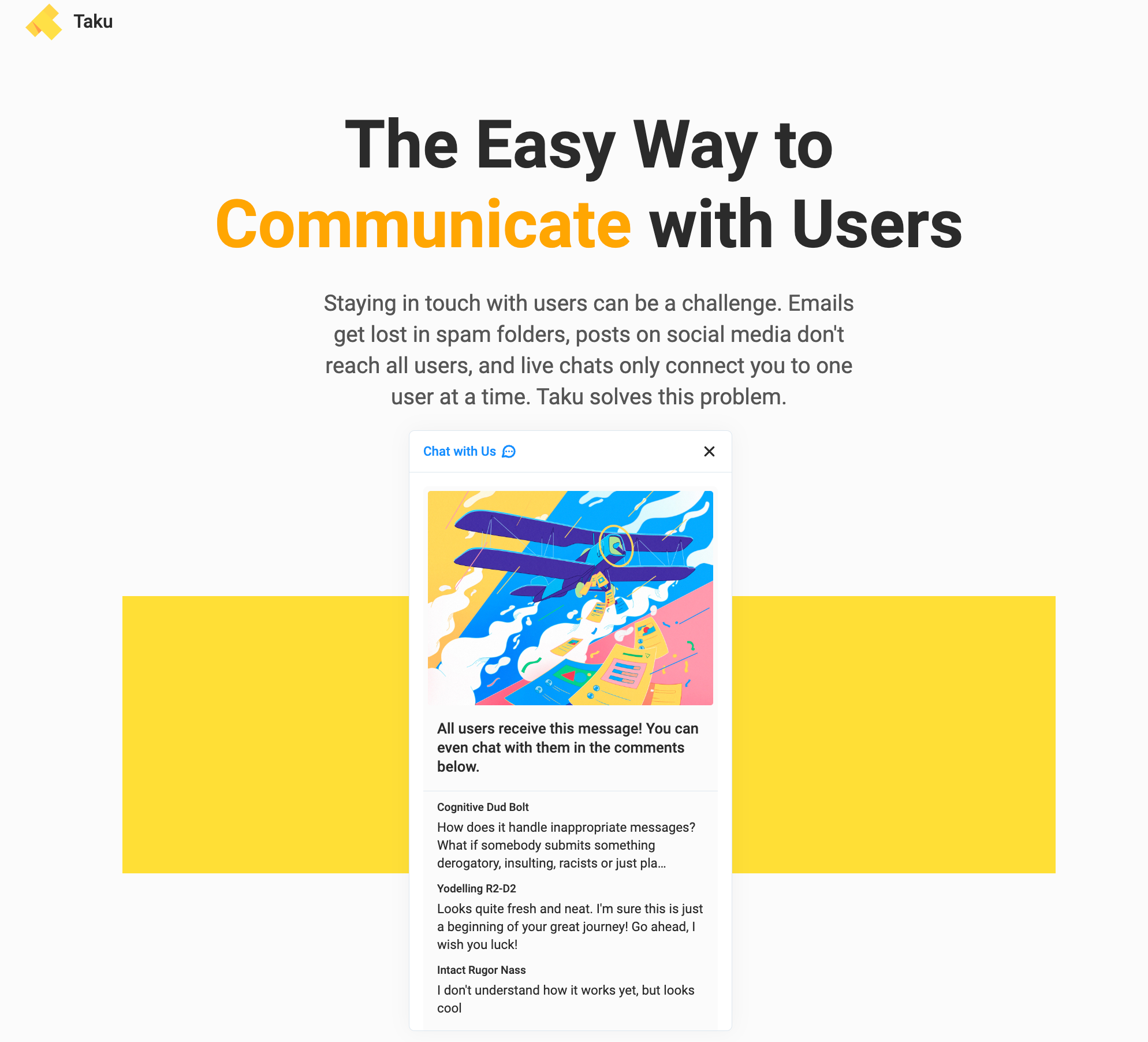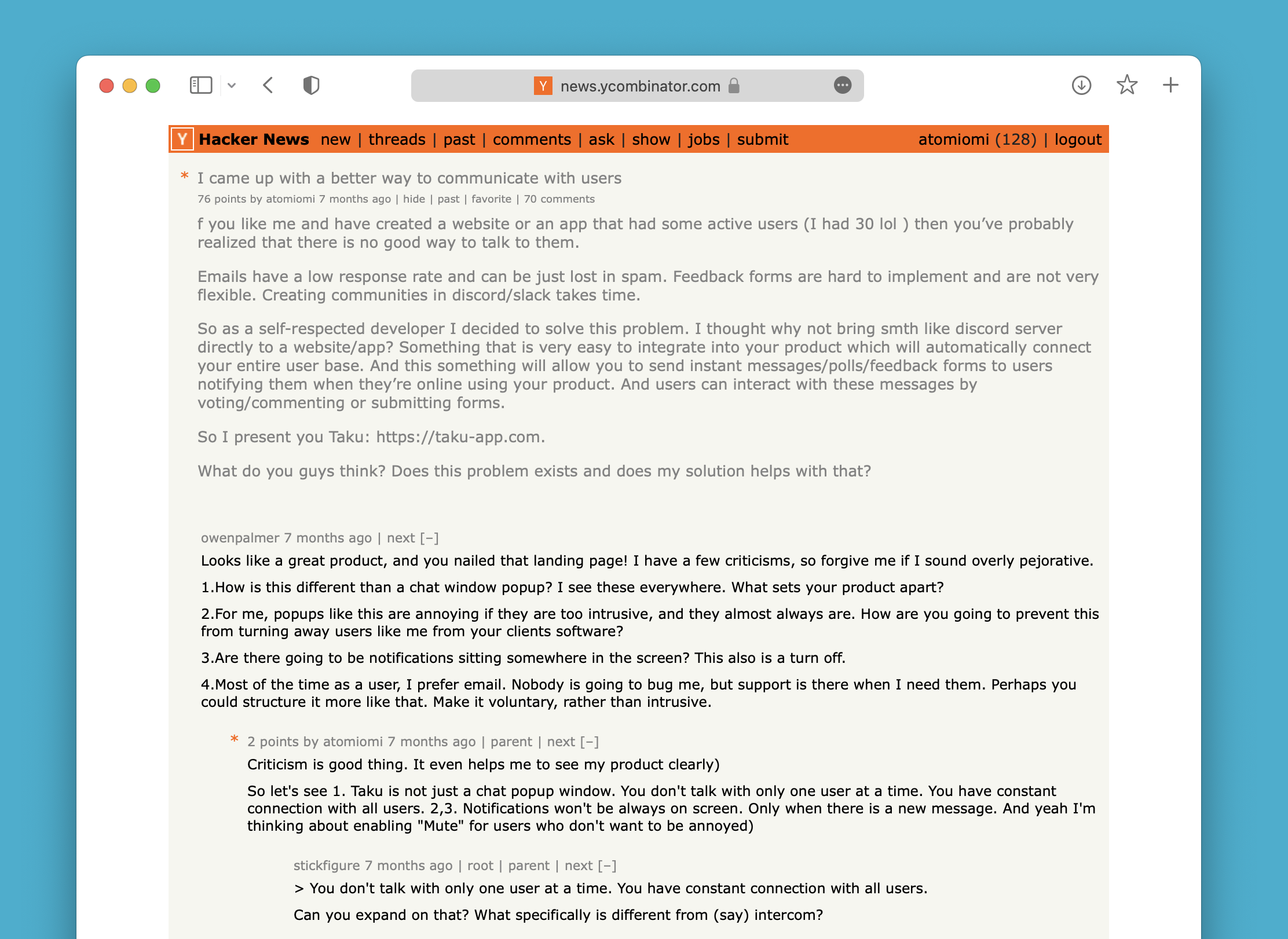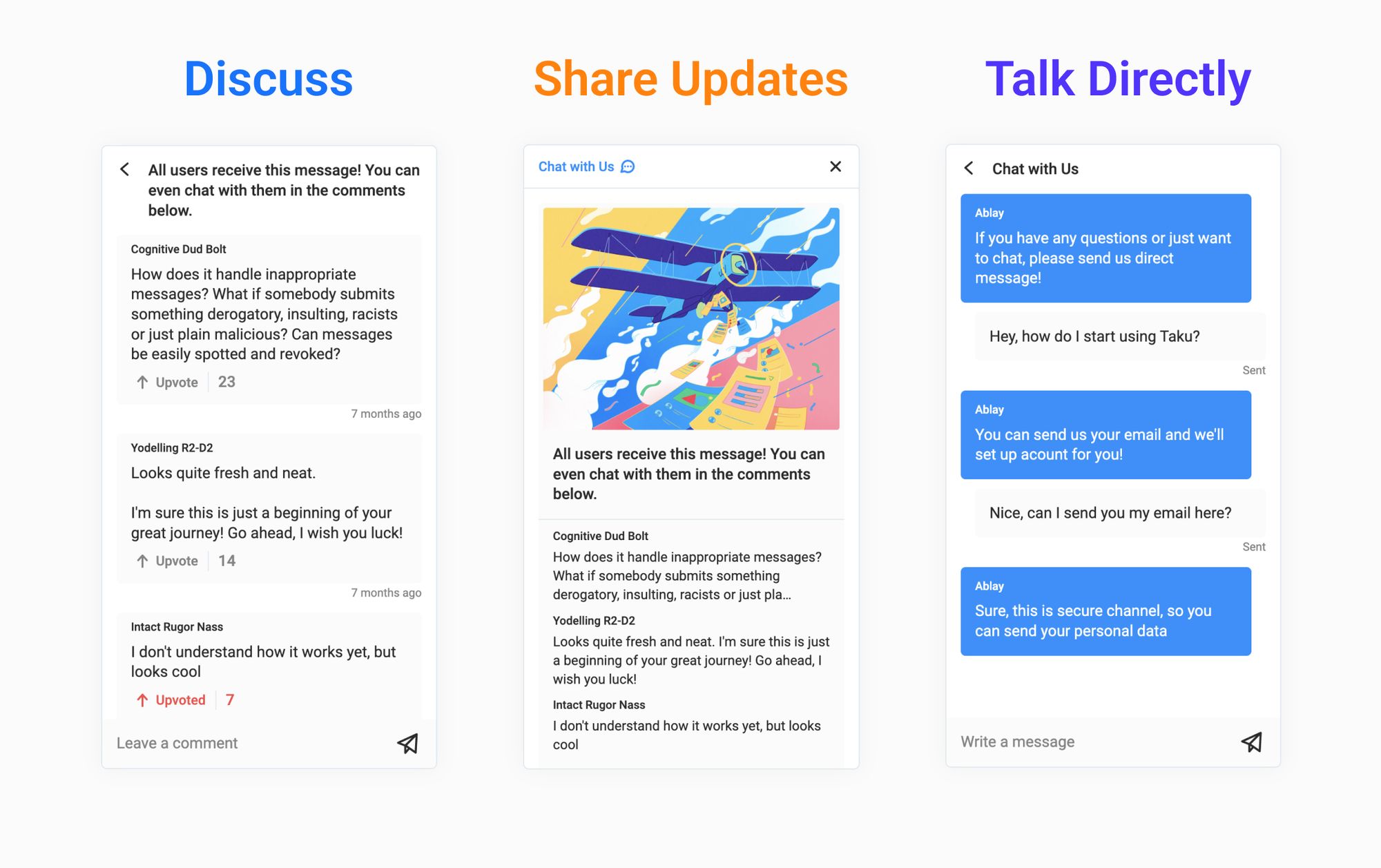Taku is a groundbreaking widget created by Abylay Keldibek, designed to enhance communication within your website or app. This innovative tool allows you to broadcast messages seamlessly to your entire user base, ensuring effective engagement and improved user experience.
Tell us more about Taku

Taku was developed to address a challenge I faced with my previous application, a digital diary where users could write their thoughts. The problem was communicating effectively with users about new features or soliciting feedback. Traditional methods, such as emails and feedback forms, didn't yield satisfactory results.
I found that Discord servers were more effective, as users who joined them tended to be more active and responsive. They could easily be informed about new features, watch explanatory videos, and engage directly with me. However, not all users had access to Discord, which is predominantly used by younger generations.
That's when I conceived the idea of Taku - a platform similar to Discord but integrated directly into a website. Taku would enable seamless communication between the site owner and users, allowing users to receive notifications, and engage with posts, like, and comments.
Initially, I built a landing page to gauge interest in the solution. After posting on Hacker News and Twitter, I received significant positive feedback, confirming that others faced the same issue. Encouraged by the response, I decided to develop Taku.
What’s your background, and how did you come up with the idea?
My background is primarily in front-end development, and I am currently transitioning from working as a developer to focusing on creating my products. The idea for this particular project emerged from a recurring problem I noticed among my friends. They frequently asked if there was an app where they could write notes and attach them to specific dates. Realizing the demand for such a product, I decided to build a diary application to address their needs.
Once I began gaining more users, I encountered a new challenge: I could not communicate directly with them. This led to the creation of Taku, which was inspired by the need for a platform that could function as a communication tool, similar to Discord. I figured other founders might also face similar issues, so I turned to Hacker News as a platform to gather insights and share my solution.
How did you get your first customers during the early stage of the company?
During the early stage of the company, our focus was to identify potential customers who could benefit from our product and were willing to give it a try. We believed that founders of startups would be the ideal target audience, as they are more open to experimenting with new tools compared to larger companies that might be hesitant to take risks.
To reach these potential customers, we utilized resources like Y Combinator's directory, which publishes a list of startups they have invested in each quarter. By browsing the directory, we were able to gather information on the founders, locate their LinkedIn profiles, and obtain their contact details. We then initiated communication by sending emails to these founders, which resulted in some positive responses and helped us acquire our first customers.

How is the business doing today?
Today, the business has a modest customer base with three paying clients, each contributing $20 per month in revenue.
What marketing channels are working well to acquire customers?
The marketing channels that have proven effective in acquiring customers for us include LinkedIn and Twitter. We utilize LinkedIn to obtain email addresses and subsequently reach out to potential clients via email. Twitter has also been beneficial, particularly for connecting with solo developers. However, it has proven more challenging to engage with startups or established companies through this platform.

What has been your biggest achievement so far?
My biggest achievements thus far include being featured on Hacker News, which generated significant interest and responses. This exposure led to two potential investors approaching us, expressing their interest in investing once we have acquired more customers. Additionally, securing our first customer has been a significant milestone in our journey.
What has been the biggest challenge in your journey?
The biggest challenge in my journey has been the contrast between product development and marketing. With product development, it's easy to see tangible results as you build features and witness the progress firsthand. However, marketing and acquiring customers is a less straightforward process.
It's possible to invest time and effort into marketing for two weeks without seeing any immediate results, only to suddenly receive a surge of responses and feedback from users. Navigating this aspect of the business has been particularly challenging for me, as it's new and unfamiliar territory.
What’s something you know now that you wish you had known when you started?
One important lesson I've learned since starting is the value of building quickly and not getting bogged down with concerns about performance and scalability, which can often be the mindset when working in large companies. In the initial stages of developing your product, the focus should be gathering user feedback and iterating based on that input.
Overemphasizing performance and system capabilities can lead to spending months on development without acquiring any users. Concentrating on attracting users, receiving their feedback, and making improvements is more beneficial. If your system encounters issues due to an influx of requests, it's a good problem to have and can be addressed at that point.
What advice would you give to new entrepreneurs?
One crucial piece of advice is to iterate quickly. Avoid spending excessive time on a single step; if something isn't working, adapt and make changes. Obtaining feedback is of utmost importance, so prioritize gathering it as soon as possible.
This philosophy is the driving force behind our product, Taku. It's designed to enable founders to receive direct feedback from their initial users, fostering a valuable and continuous feedback loop that can significantly impact their success.
What are your plans for the next 6- 12 months?
Over the next 6 to 12 months, I will focus on developing and refining my two products, the JustDiary application and Taku. We are not only concentrating on gathering customer feedback but also expanding Taku to address another issue related to user feedback processing.
We've noticed that small teams often struggle to manage the influx of user feedback due to limited capacity. As a result, we are currently working on an analytics tool that can organize and categorize feedback by topics, showing the most frequently requested features or bugs. Users will also be able to view all the issues and upvote them, influencing the priority of each issue.
At this stage, we are not prioritizing user acquisition, as we have already identified strategies for that. Instead, our goal is to build products that provide genuine value, even if it's for a single company. Once we achieve this, we can then focus on scaling our solutions.
Where can people get in touch with you?
People may reach me on LinkedIn or visit our website for more information.







